Promoting Mental Health and Wellbeing
VerifiedAdded on 2022/10/10
|8
|2285
|193
AI Summary
This article discusses the importance of promoting mental health and wellbeing. It includes a case study of a patient with depression and how mental status examination can help in deriving psychiatric diagnoses. It also talks about the causes of depression and how a recovery-oriented mental health care strategy can help in personal mental health recovery.
Contribute Materials
Your contribution can guide someone’s learning journey. Share your
documents today.
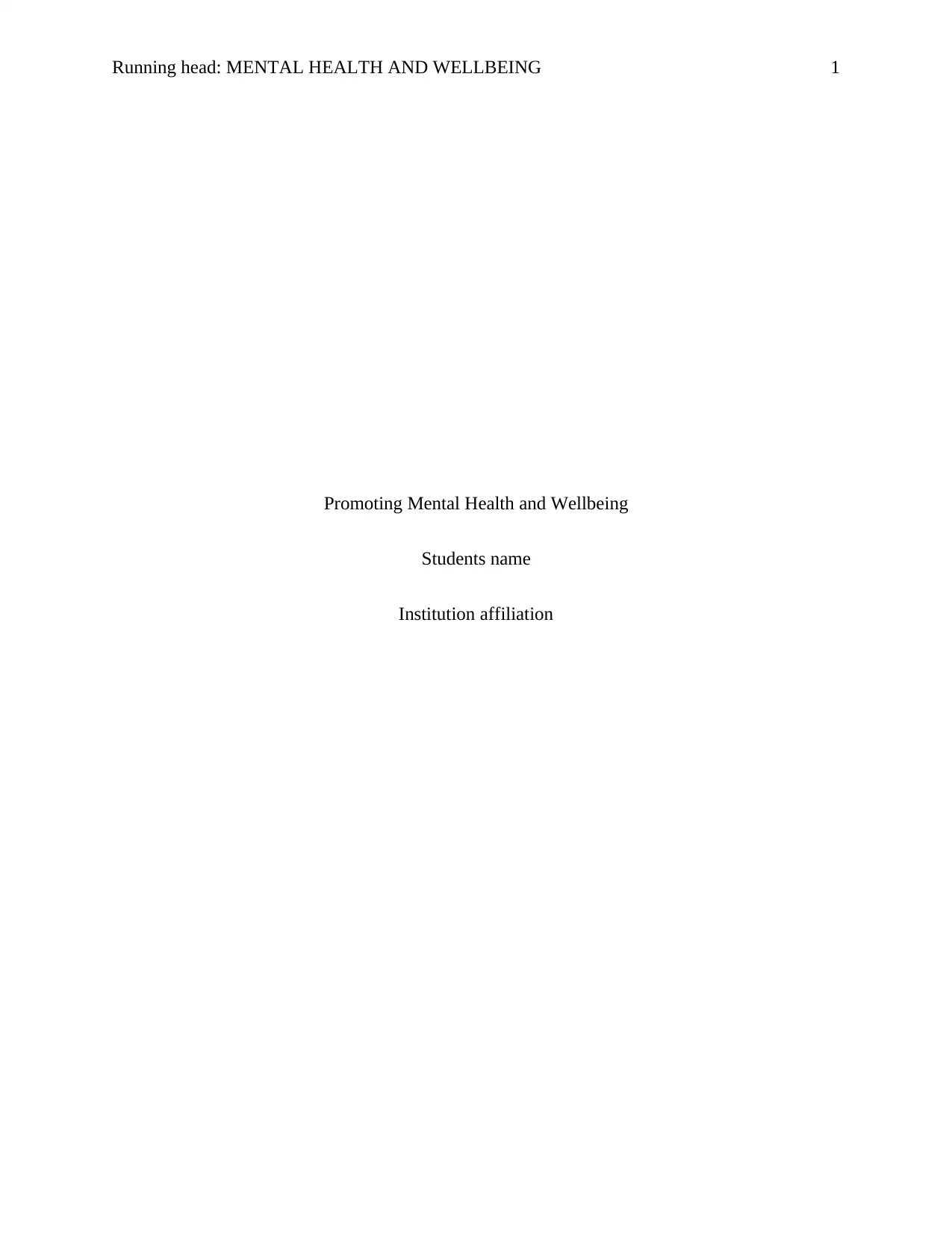
Running head: MENTAL HEALTH AND WELLBEING 1
Promoting Mental Health and Wellbeing
Students name
Institution affiliation
Promoting Mental Health and Wellbeing
Students name
Institution affiliation
Secure Best Marks with AI Grader
Need help grading? Try our AI Grader for instant feedback on your assignments.
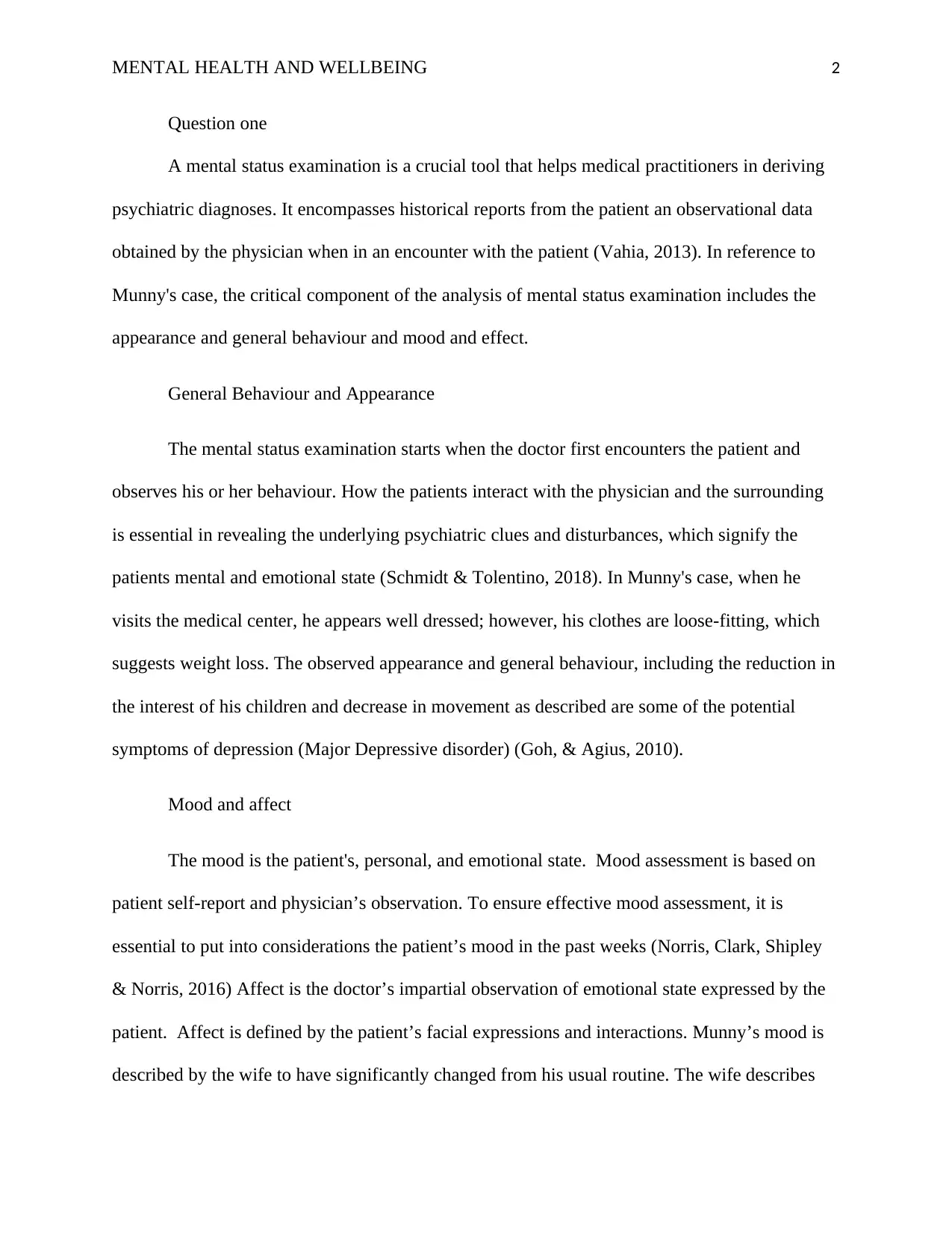
MENTAL HEALTH AND WELLBEING 2
Question one
A mental status examination is a crucial tool that helps medical practitioners in deriving
psychiatric diagnoses. It encompasses historical reports from the patient an observational data
obtained by the physician when in an encounter with the patient (Vahia, 2013). In reference to
Munny's case, the critical component of the analysis of mental status examination includes the
appearance and general behaviour and mood and effect.
General Behaviour and Appearance
The mental status examination starts when the doctor first encounters the patient and
observes his or her behaviour. How the patients interact with the physician and the surrounding
is essential in revealing the underlying psychiatric clues and disturbances, which signify the
patients mental and emotional state (Schmidt & Tolentino, 2018). In Munny's case, when he
visits the medical center, he appears well dressed; however, his clothes are loose-fitting, which
suggests weight loss. The observed appearance and general behaviour, including the reduction in
the interest of his children and decrease in movement as described are some of the potential
symptoms of depression (Major Depressive disorder) (Goh, & Agius, 2010).
Mood and affect
The mood is the patient's, personal, and emotional state. Mood assessment is based on
patient self-report and physician’s observation. To ensure effective mood assessment, it is
essential to put into considerations the patient’s mood in the past weeks (Norris, Clark, Shipley
& Norris, 2016) Affect is the doctor’s impartial observation of emotional state expressed by the
patient. Affect is defined by the patient’s facial expressions and interactions. Munny’s mood is
described by the wife to have significantly changed from his usual routine. The wife describes
Question one
A mental status examination is a crucial tool that helps medical practitioners in deriving
psychiatric diagnoses. It encompasses historical reports from the patient an observational data
obtained by the physician when in an encounter with the patient (Vahia, 2013). In reference to
Munny's case, the critical component of the analysis of mental status examination includes the
appearance and general behaviour and mood and effect.
General Behaviour and Appearance
The mental status examination starts when the doctor first encounters the patient and
observes his or her behaviour. How the patients interact with the physician and the surrounding
is essential in revealing the underlying psychiatric clues and disturbances, which signify the
patients mental and emotional state (Schmidt & Tolentino, 2018). In Munny's case, when he
visits the medical center, he appears well dressed; however, his clothes are loose-fitting, which
suggests weight loss. The observed appearance and general behaviour, including the reduction in
the interest of his children and decrease in movement as described are some of the potential
symptoms of depression (Major Depressive disorder) (Goh, & Agius, 2010).
Mood and affect
The mood is the patient's, personal, and emotional state. Mood assessment is based on
patient self-report and physician’s observation. To ensure effective mood assessment, it is
essential to put into considerations the patient’s mood in the past weeks (Norris, Clark, Shipley
& Norris, 2016) Affect is the doctor’s impartial observation of emotional state expressed by the
patient. Affect is defined by the patient’s facial expressions and interactions. Munny’s mood is
described by the wife to have significantly changed from his usual routine. The wife describes
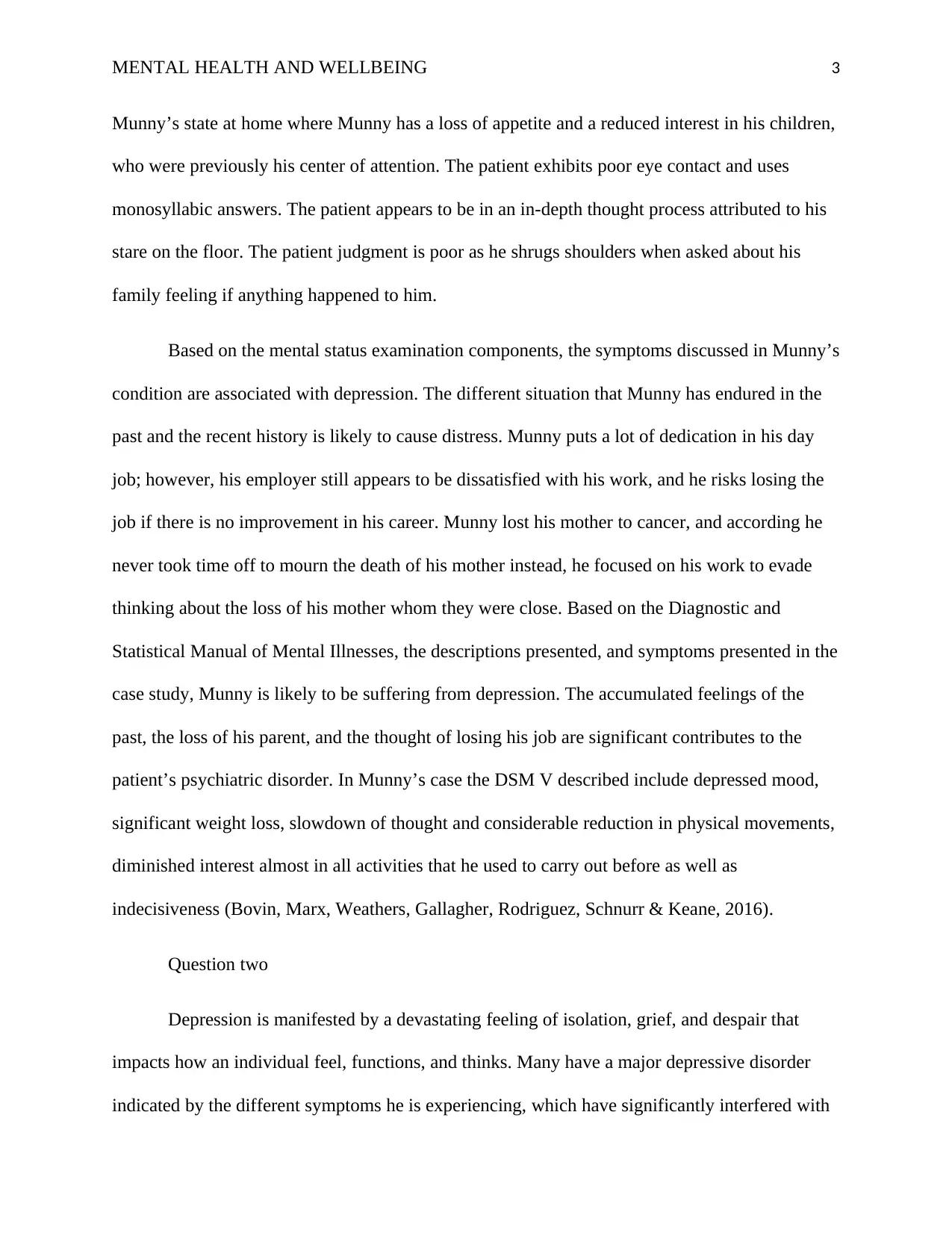
MENTAL HEALTH AND WELLBEING 3
Munny’s state at home where Munny has a loss of appetite and a reduced interest in his children,
who were previously his center of attention. The patient exhibits poor eye contact and uses
monosyllabic answers. The patient appears to be in an in-depth thought process attributed to his
stare on the floor. The patient judgment is poor as he shrugs shoulders when asked about his
family feeling if anything happened to him.
Based on the mental status examination components, the symptoms discussed in Munny’s
condition are associated with depression. The different situation that Munny has endured in the
past and the recent history is likely to cause distress. Munny puts a lot of dedication in his day
job; however, his employer still appears to be dissatisfied with his work, and he risks losing the
job if there is no improvement in his career. Munny lost his mother to cancer, and according he
never took time off to mourn the death of his mother instead, he focused on his work to evade
thinking about the loss of his mother whom they were close. Based on the Diagnostic and
Statistical Manual of Mental Illnesses, the descriptions presented, and symptoms presented in the
case study, Munny is likely to be suffering from depression. The accumulated feelings of the
past, the loss of his parent, and the thought of losing his job are significant contributes to the
patient’s psychiatric disorder. In Munny’s case the DSM V described include depressed mood,
significant weight loss, slowdown of thought and considerable reduction in physical movements,
diminished interest almost in all activities that he used to carry out before as well as
indecisiveness (Bovin, Marx, Weathers, Gallagher, Rodriguez, Schnurr & Keane, 2016).
Question two
Depression is manifested by a devastating feeling of isolation, grief, and despair that
impacts how an individual feel, functions, and thinks. Many have a major depressive disorder
indicated by the different symptoms he is experiencing, which have significantly interfered with
Munny’s state at home where Munny has a loss of appetite and a reduced interest in his children,
who were previously his center of attention. The patient exhibits poor eye contact and uses
monosyllabic answers. The patient appears to be in an in-depth thought process attributed to his
stare on the floor. The patient judgment is poor as he shrugs shoulders when asked about his
family feeling if anything happened to him.
Based on the mental status examination components, the symptoms discussed in Munny’s
condition are associated with depression. The different situation that Munny has endured in the
past and the recent history is likely to cause distress. Munny puts a lot of dedication in his day
job; however, his employer still appears to be dissatisfied with his work, and he risks losing the
job if there is no improvement in his career. Munny lost his mother to cancer, and according he
never took time off to mourn the death of his mother instead, he focused on his work to evade
thinking about the loss of his mother whom they were close. Based on the Diagnostic and
Statistical Manual of Mental Illnesses, the descriptions presented, and symptoms presented in the
case study, Munny is likely to be suffering from depression. The accumulated feelings of the
past, the loss of his parent, and the thought of losing his job are significant contributes to the
patient’s psychiatric disorder. In Munny’s case the DSM V described include depressed mood,
significant weight loss, slowdown of thought and considerable reduction in physical movements,
diminished interest almost in all activities that he used to carry out before as well as
indecisiveness (Bovin, Marx, Weathers, Gallagher, Rodriguez, Schnurr & Keane, 2016).
Question two
Depression is manifested by a devastating feeling of isolation, grief, and despair that
impacts how an individual feel, functions, and thinks. Many have a major depressive disorder
indicated by the different symptoms he is experiencing, which have significantly interfered with
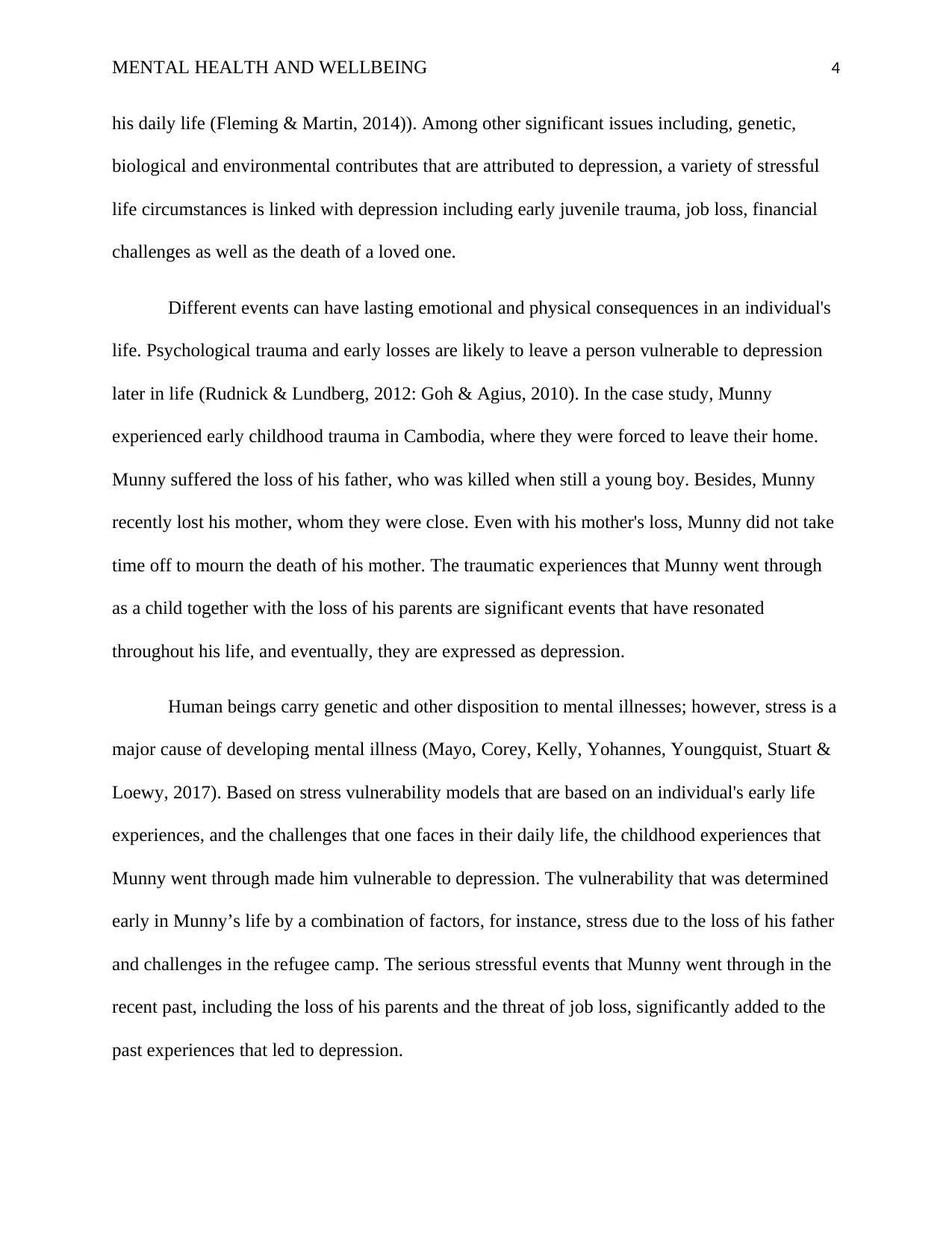
MENTAL HEALTH AND WELLBEING 4
his daily life (Fleming & Martin, 2014)). Among other significant issues including, genetic,
biological and environmental contributes that are attributed to depression, a variety of stressful
life circumstances is linked with depression including early juvenile trauma, job loss, financial
challenges as well as the death of a loved one.
Different events can have lasting emotional and physical consequences in an individual's
life. Psychological trauma and early losses are likely to leave a person vulnerable to depression
later in life (Rudnick & Lundberg, 2012: Goh & Agius, 2010). In the case study, Munny
experienced early childhood trauma in Cambodia, where they were forced to leave their home.
Munny suffered the loss of his father, who was killed when still a young boy. Besides, Munny
recently lost his mother, whom they were close. Even with his mother's loss, Munny did not take
time off to mourn the death of his mother. The traumatic experiences that Munny went through
as a child together with the loss of his parents are significant events that have resonated
throughout his life, and eventually, they are expressed as depression.
Human beings carry genetic and other disposition to mental illnesses; however, stress is a
major cause of developing mental illness (Mayo, Corey, Kelly, Yohannes, Youngquist, Stuart &
Loewy, 2017). Based on stress vulnerability models that are based on an individual's early life
experiences, and the challenges that one faces in their daily life, the childhood experiences that
Munny went through made him vulnerable to depression. The vulnerability that was determined
early in Munny’s life by a combination of factors, for instance, stress due to the loss of his father
and challenges in the refugee camp. The serious stressful events that Munny went through in the
recent past, including the loss of his parents and the threat of job loss, significantly added to the
past experiences that led to depression.
his daily life (Fleming & Martin, 2014)). Among other significant issues including, genetic,
biological and environmental contributes that are attributed to depression, a variety of stressful
life circumstances is linked with depression including early juvenile trauma, job loss, financial
challenges as well as the death of a loved one.
Different events can have lasting emotional and physical consequences in an individual's
life. Psychological trauma and early losses are likely to leave a person vulnerable to depression
later in life (Rudnick & Lundberg, 2012: Goh & Agius, 2010). In the case study, Munny
experienced early childhood trauma in Cambodia, where they were forced to leave their home.
Munny suffered the loss of his father, who was killed when still a young boy. Besides, Munny
recently lost his mother, whom they were close. Even with his mother's loss, Munny did not take
time off to mourn the death of his mother. The traumatic experiences that Munny went through
as a child together with the loss of his parents are significant events that have resonated
throughout his life, and eventually, they are expressed as depression.
Human beings carry genetic and other disposition to mental illnesses; however, stress is a
major cause of developing mental illness (Mayo, Corey, Kelly, Yohannes, Youngquist, Stuart &
Loewy, 2017). Based on stress vulnerability models that are based on an individual's early life
experiences, and the challenges that one faces in their daily life, the childhood experiences that
Munny went through made him vulnerable to depression. The vulnerability that was determined
early in Munny’s life by a combination of factors, for instance, stress due to the loss of his father
and challenges in the refugee camp. The serious stressful events that Munny went through in the
recent past, including the loss of his parents and the threat of job loss, significantly added to the
past experiences that led to depression.
Secure Best Marks with AI Grader
Need help grading? Try our AI Grader for instant feedback on your assignments.
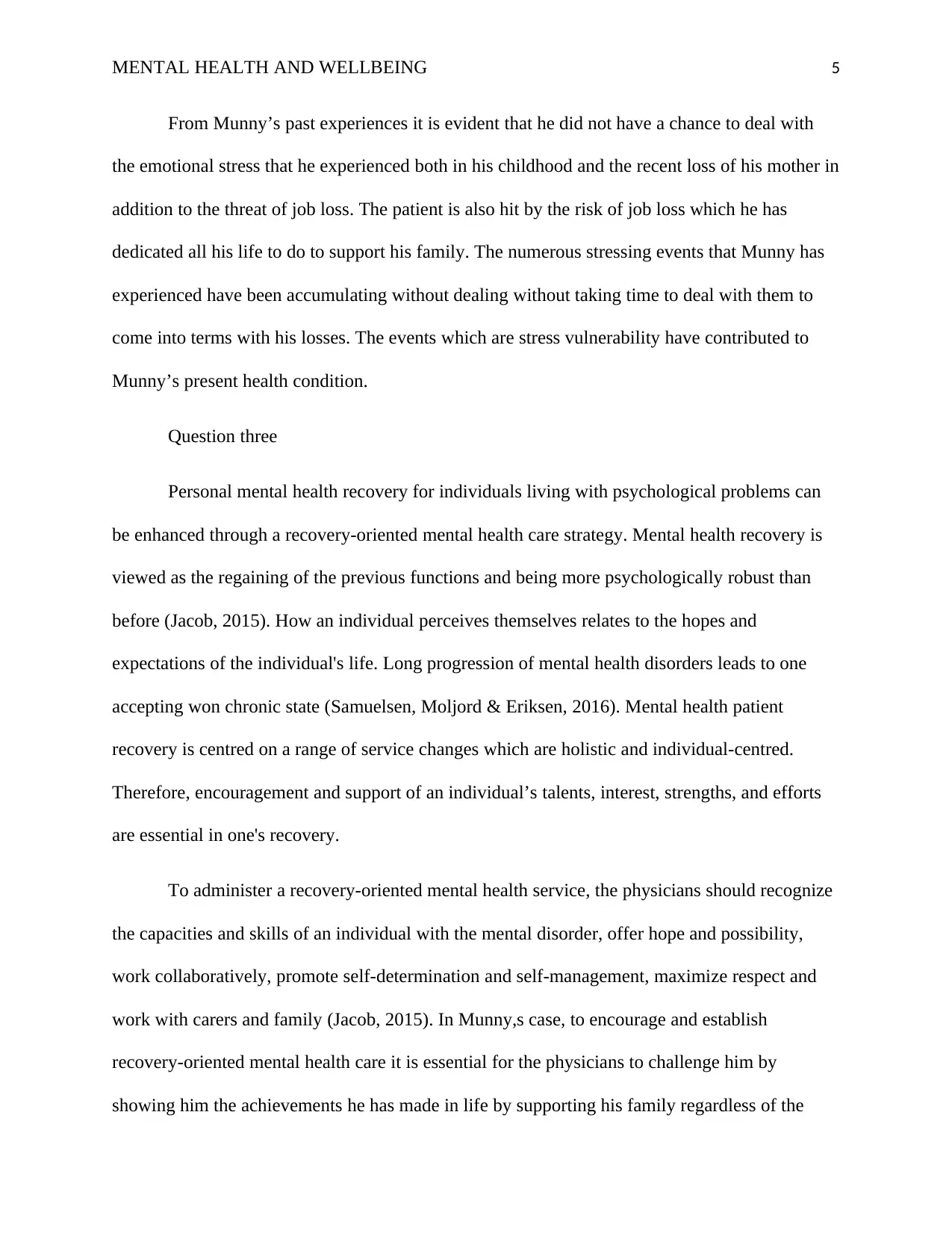
MENTAL HEALTH AND WELLBEING 5
From Munny’s past experiences it is evident that he did not have a chance to deal with
the emotional stress that he experienced both in his childhood and the recent loss of his mother in
addition to the threat of job loss. The patient is also hit by the risk of job loss which he has
dedicated all his life to do to support his family. The numerous stressing events that Munny has
experienced have been accumulating without dealing without taking time to deal with them to
come into terms with his losses. The events which are stress vulnerability have contributed to
Munny’s present health condition.
Question three
Personal mental health recovery for individuals living with psychological problems can
be enhanced through a recovery-oriented mental health care strategy. Mental health recovery is
viewed as the regaining of the previous functions and being more psychologically robust than
before (Jacob, 2015). How an individual perceives themselves relates to the hopes and
expectations of the individual's life. Long progression of mental health disorders leads to one
accepting won chronic state (Samuelsen, Moljord & Eriksen, 2016). Mental health patient
recovery is centred on a range of service changes which are holistic and individual-centred.
Therefore, encouragement and support of an individual’s talents, interest, strengths, and efforts
are essential in one's recovery.
To administer a recovery-oriented mental health service, the physicians should recognize
the capacities and skills of an individual with the mental disorder, offer hope and possibility,
work collaboratively, promote self-determination and self-management, maximize respect and
work with carers and family (Jacob, 2015). In Munny,s case, to encourage and establish
recovery-oriented mental health care it is essential for the physicians to challenge him by
showing him the achievements he has made in life by supporting his family regardless of the
From Munny’s past experiences it is evident that he did not have a chance to deal with
the emotional stress that he experienced both in his childhood and the recent loss of his mother in
addition to the threat of job loss. The patient is also hit by the risk of job loss which he has
dedicated all his life to do to support his family. The numerous stressing events that Munny has
experienced have been accumulating without dealing without taking time to deal with them to
come into terms with his losses. The events which are stress vulnerability have contributed to
Munny’s present health condition.
Question three
Personal mental health recovery for individuals living with psychological problems can
be enhanced through a recovery-oriented mental health care strategy. Mental health recovery is
viewed as the regaining of the previous functions and being more psychologically robust than
before (Jacob, 2015). How an individual perceives themselves relates to the hopes and
expectations of the individual's life. Long progression of mental health disorders leads to one
accepting won chronic state (Samuelsen, Moljord & Eriksen, 2016). Mental health patient
recovery is centred on a range of service changes which are holistic and individual-centred.
Therefore, encouragement and support of an individual’s talents, interest, strengths, and efforts
are essential in one's recovery.
To administer a recovery-oriented mental health service, the physicians should recognize
the capacities and skills of an individual with the mental disorder, offer hope and possibility,
work collaboratively, promote self-determination and self-management, maximize respect and
work with carers and family (Jacob, 2015). In Munny,s case, to encourage and establish
recovery-oriented mental health care it is essential for the physicians to challenge him by
showing him the achievements he has made in life by supporting his family regardless of the
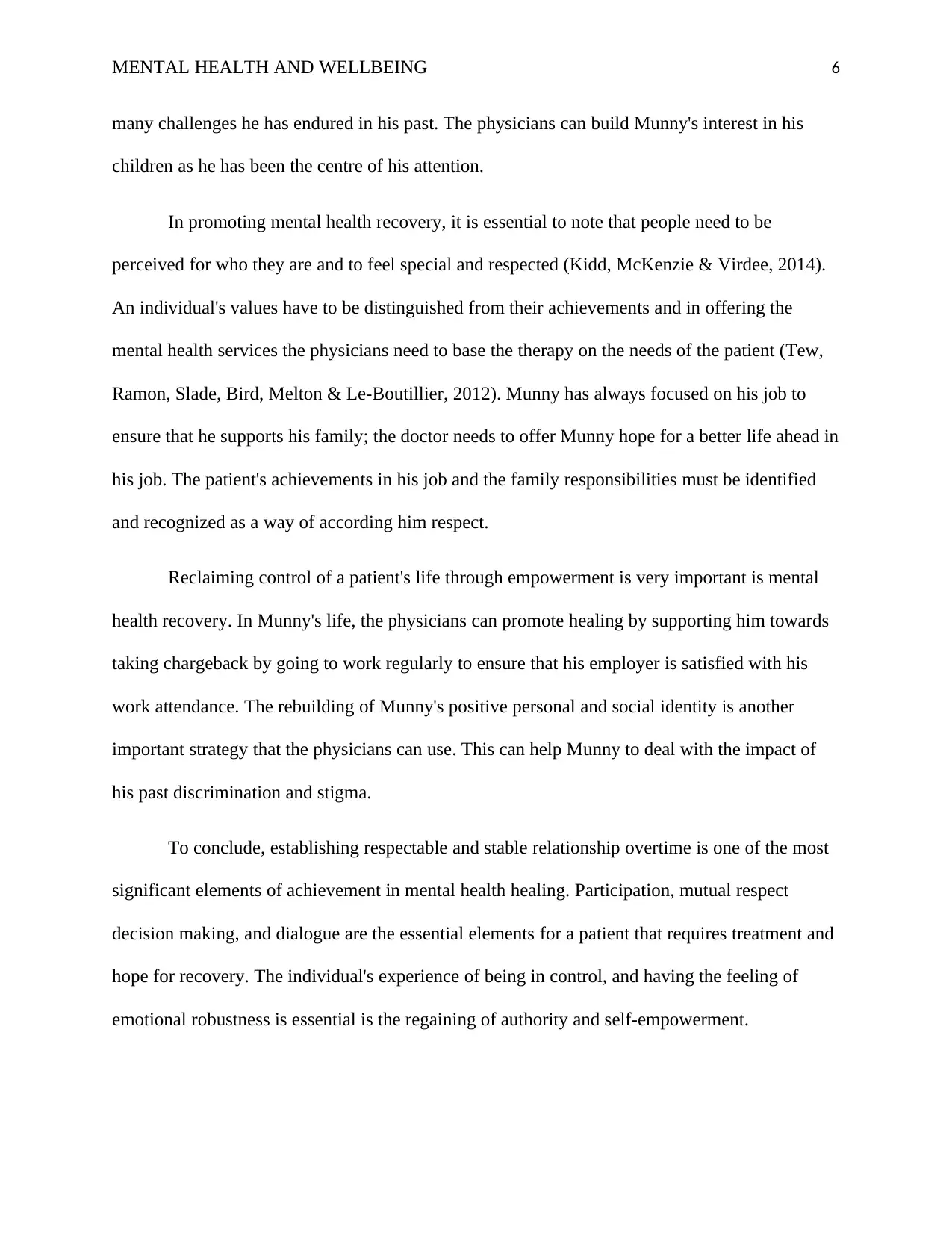
MENTAL HEALTH AND WELLBEING 6
many challenges he has endured in his past. The physicians can build Munny's interest in his
children as he has been the centre of his attention.
In promoting mental health recovery, it is essential to note that people need to be
perceived for who they are and to feel special and respected (Kidd, McKenzie & Virdee, 2014).
An individual's values have to be distinguished from their achievements and in offering the
mental health services the physicians need to base the therapy on the needs of the patient (Tew,
Ramon, Slade, Bird, Melton & Le-Boutillier, 2012). Munny has always focused on his job to
ensure that he supports his family; the doctor needs to offer Munny hope for a better life ahead in
his job. The patient's achievements in his job and the family responsibilities must be identified
and recognized as a way of according him respect.
Reclaiming control of a patient's life through empowerment is very important is mental
health recovery. In Munny's life, the physicians can promote healing by supporting him towards
taking chargeback by going to work regularly to ensure that his employer is satisfied with his
work attendance. The rebuilding of Munny's positive personal and social identity is another
important strategy that the physicians can use. This can help Munny to deal with the impact of
his past discrimination and stigma.
To conclude, establishing respectable and stable relationship overtime is one of the most
significant elements of achievement in mental health healing. Participation, mutual respect
decision making, and dialogue are the essential elements for a patient that requires treatment and
hope for recovery. The individual's experience of being in control, and having the feeling of
emotional robustness is essential is the regaining of authority and self-empowerment.
many challenges he has endured in his past. The physicians can build Munny's interest in his
children as he has been the centre of his attention.
In promoting mental health recovery, it is essential to note that people need to be
perceived for who they are and to feel special and respected (Kidd, McKenzie & Virdee, 2014).
An individual's values have to be distinguished from their achievements and in offering the
mental health services the physicians need to base the therapy on the needs of the patient (Tew,
Ramon, Slade, Bird, Melton & Le-Boutillier, 2012). Munny has always focused on his job to
ensure that he supports his family; the doctor needs to offer Munny hope for a better life ahead in
his job. The patient's achievements in his job and the family responsibilities must be identified
and recognized as a way of according him respect.
Reclaiming control of a patient's life through empowerment is very important is mental
health recovery. In Munny's life, the physicians can promote healing by supporting him towards
taking chargeback by going to work regularly to ensure that his employer is satisfied with his
work attendance. The rebuilding of Munny's positive personal and social identity is another
important strategy that the physicians can use. This can help Munny to deal with the impact of
his past discrimination and stigma.
To conclude, establishing respectable and stable relationship overtime is one of the most
significant elements of achievement in mental health healing. Participation, mutual respect
decision making, and dialogue are the essential elements for a patient that requires treatment and
hope for recovery. The individual's experience of being in control, and having the feeling of
emotional robustness is essential is the regaining of authority and self-empowerment.
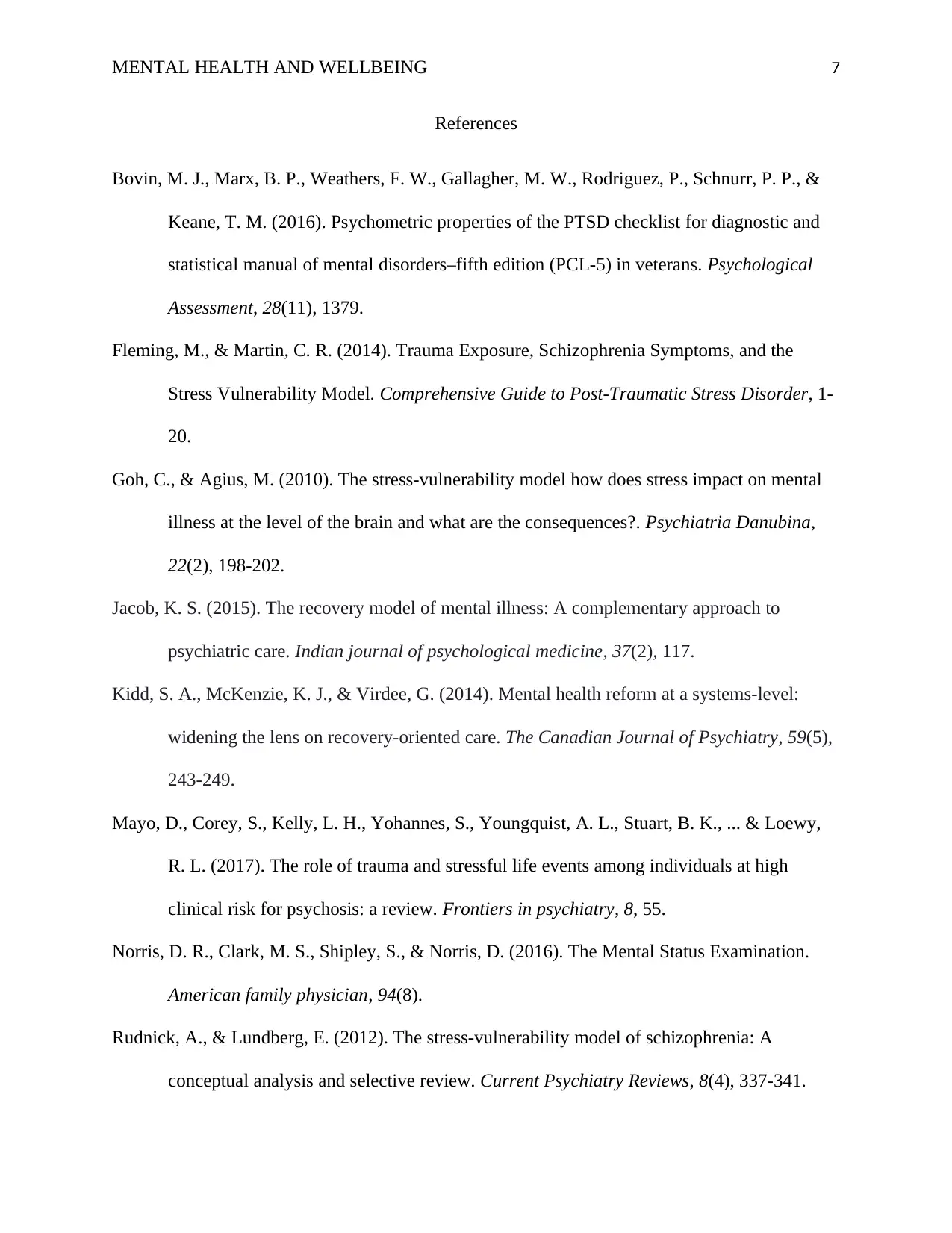
MENTAL HEALTH AND WELLBEING 7
References
Bovin, M. J., Marx, B. P., Weathers, F. W., Gallagher, M. W., Rodriguez, P., Schnurr, P. P., &
Keane, T. M. (2016). Psychometric properties of the PTSD checklist for diagnostic and
statistical manual of mental disorders–fifth edition (PCL-5) in veterans. Psychological
Assessment, 28(11), 1379.
Fleming, M., & Martin, C. R. (2014). Trauma Exposure, Schizophrenia Symptoms, and the
Stress Vulnerability Model. Comprehensive Guide to Post-Traumatic Stress Disorder, 1-
20.
Goh, C., & Agius, M. (2010). The stress-vulnerability model how does stress impact on mental
illness at the level of the brain and what are the consequences?. Psychiatria Danubina,
22(2), 198-202.
Jacob, K. S. (2015). The recovery model of mental illness: A complementary approach to
psychiatric care. Indian journal of psychological medicine, 37(2), 117.
Kidd, S. A., McKenzie, K. J., & Virdee, G. (2014). Mental health reform at a systems-level:
widening the lens on recovery-oriented care. The Canadian Journal of Psychiatry, 59(5),
243-249.
Mayo, D., Corey, S., Kelly, L. H., Yohannes, S., Youngquist, A. L., Stuart, B. K., ... & Loewy,
R. L. (2017). The role of trauma and stressful life events among individuals at high
clinical risk for psychosis: a review. Frontiers in psychiatry, 8, 55.
Norris, D. R., Clark, M. S., Shipley, S., & Norris, D. (2016). The Mental Status Examination.
American family physician, 94(8).
Rudnick, A., & Lundberg, E. (2012). The stress-vulnerability model of schizophrenia: A
conceptual analysis and selective review. Current Psychiatry Reviews, 8(4), 337-341.
References
Bovin, M. J., Marx, B. P., Weathers, F. W., Gallagher, M. W., Rodriguez, P., Schnurr, P. P., &
Keane, T. M. (2016). Psychometric properties of the PTSD checklist for diagnostic and
statistical manual of mental disorders–fifth edition (PCL-5) in veterans. Psychological
Assessment, 28(11), 1379.
Fleming, M., & Martin, C. R. (2014). Trauma Exposure, Schizophrenia Symptoms, and the
Stress Vulnerability Model. Comprehensive Guide to Post-Traumatic Stress Disorder, 1-
20.
Goh, C., & Agius, M. (2010). The stress-vulnerability model how does stress impact on mental
illness at the level of the brain and what are the consequences?. Psychiatria Danubina,
22(2), 198-202.
Jacob, K. S. (2015). The recovery model of mental illness: A complementary approach to
psychiatric care. Indian journal of psychological medicine, 37(2), 117.
Kidd, S. A., McKenzie, K. J., & Virdee, G. (2014). Mental health reform at a systems-level:
widening the lens on recovery-oriented care. The Canadian Journal of Psychiatry, 59(5),
243-249.
Mayo, D., Corey, S., Kelly, L. H., Yohannes, S., Youngquist, A. L., Stuart, B. K., ... & Loewy,
R. L. (2017). The role of trauma and stressful life events among individuals at high
clinical risk for psychosis: a review. Frontiers in psychiatry, 8, 55.
Norris, D. R., Clark, M. S., Shipley, S., & Norris, D. (2016). The Mental Status Examination.
American family physician, 94(8).
Rudnick, A., & Lundberg, E. (2012). The stress-vulnerability model of schizophrenia: A
conceptual analysis and selective review. Current Psychiatry Reviews, 8(4), 337-341.
Paraphrase This Document
Need a fresh take? Get an instant paraphrase of this document with our AI Paraphraser
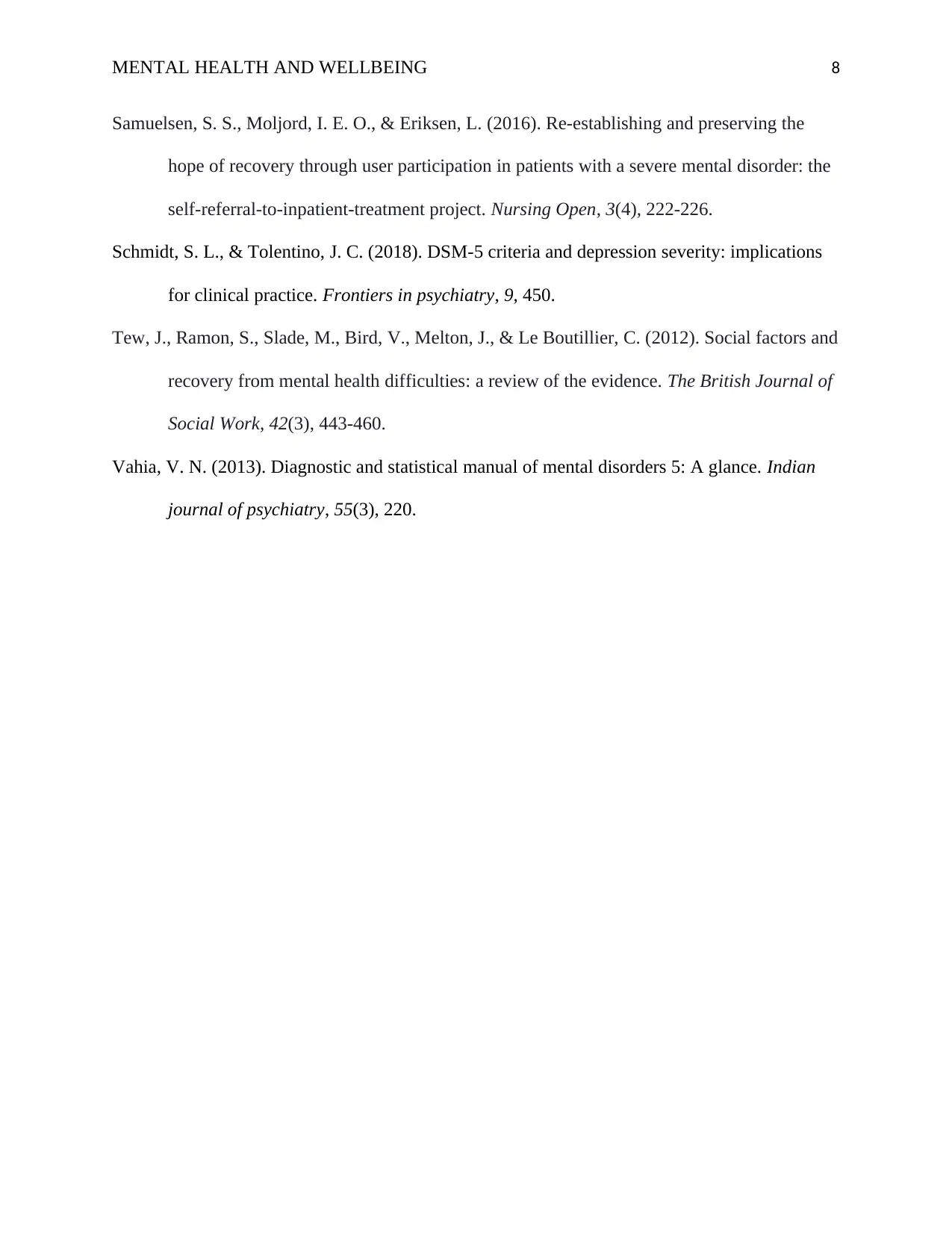
MENTAL HEALTH AND WELLBEING 8
Samuelsen, S. S., Moljord, I. E. O., & Eriksen, L. (2016). Re‐establishing and preserving the
hope of recovery through user participation in patients with a severe mental disorder: the
self‐referral‐to‐inpatient‐treatment project. Nursing Open, 3(4), 222-226.
Schmidt, S. L., & Tolentino, J. C. (2018). DSM-5 criteria and depression severity: implications
for clinical practice. Frontiers in psychiatry, 9, 450.
Tew, J., Ramon, S., Slade, M., Bird, V., Melton, J., & Le Boutillier, C. (2012). Social factors and
recovery from mental health difficulties: a review of the evidence. The British Journal of
Social Work, 42(3), 443-460.
Vahia, V. N. (2013). Diagnostic and statistical manual of mental disorders 5: A glance. Indian
journal of psychiatry, 55(3), 220.
Samuelsen, S. S., Moljord, I. E. O., & Eriksen, L. (2016). Re‐establishing and preserving the
hope of recovery through user participation in patients with a severe mental disorder: the
self‐referral‐to‐inpatient‐treatment project. Nursing Open, 3(4), 222-226.
Schmidt, S. L., & Tolentino, J. C. (2018). DSM-5 criteria and depression severity: implications
for clinical practice. Frontiers in psychiatry, 9, 450.
Tew, J., Ramon, S., Slade, M., Bird, V., Melton, J., & Le Boutillier, C. (2012). Social factors and
recovery from mental health difficulties: a review of the evidence. The British Journal of
Social Work, 42(3), 443-460.
Vahia, V. N. (2013). Diagnostic and statistical manual of mental disorders 5: A glance. Indian
journal of psychiatry, 55(3), 220.
1 out of 8
Related Documents
Your All-in-One AI-Powered Toolkit for Academic Success.
+13062052269
info@desklib.com
Available 24*7 on WhatsApp / Email
![[object Object]](/_next/static/media/star-bottom.7253800d.svg)
Unlock your academic potential
© 2024 | Zucol Services PVT LTD | All rights reserved.





